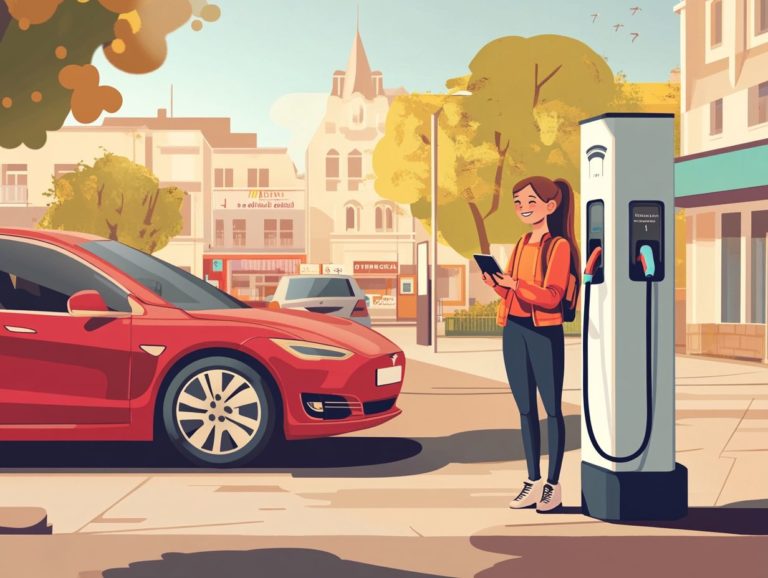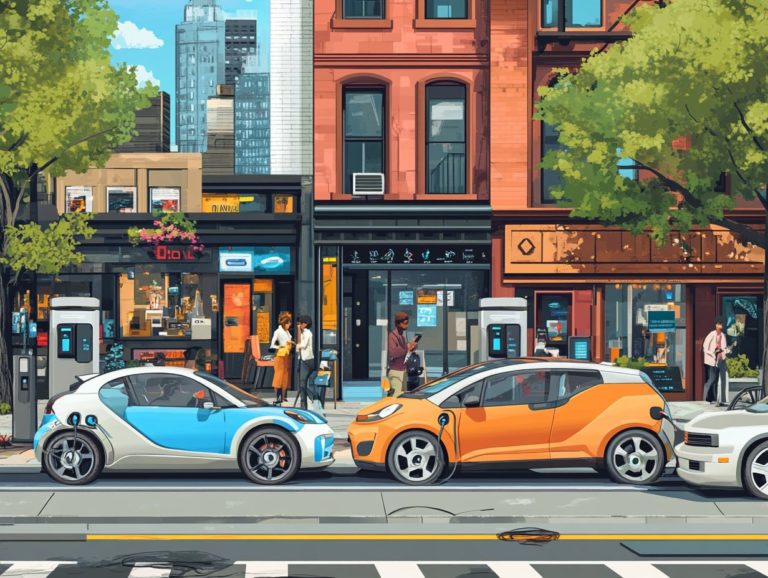what’s new in electric vehicle regulations?
Electric vehicle regulations are changing at a remarkable pace, mirroring the increasing demand for sustainable transportation.
This article delves into the current landscape of these regulations, shining a light on recent changes that are transforming the industry. It explores new laws and policies, examining their effects on manufacturers and consumers alike while addressing the challenges and controversies that emerge during this transition.
Finally, it offers a forward-looking perspective on the future of electric vehicle regulations, contemplating predictions and their implications for all stakeholders involved.
Contents
- Key Takeaways:
- Overview of Electric Vehicle Regulations
- Recent Changes in Electric Vehicle Regulations
- Challenges and Controversies
- Future of Electric Vehicle Regulations
- Frequently Asked Questions
- What is the current status of electric vehicle regulations?
- What are some recent changes in electric vehicle regulations?
- Are there any new laws or policies specifically for electric vehicles?
- What are the benefits of these new regulations for consumers?
- What impact do these regulations have on the environment?
- How can individuals stay updated on new electric vehicle regulations?
Key Takeaways:

The electric vehicle industry is constantly evolving, with new regulations being implemented to promote its growth and sustainability. Recent changes have a significant impact on the industry, shaping the future of electric vehicles. Despite challenges and controversies, the future looks promising, with potential solutions and predictions for positive implications for both consumers and companies.
Overview of Electric Vehicle Regulations
The landscape of electric vehicle regulations under the Biden-Harris Administration has undergone a remarkable transformation, especially with the introduction of the Bipartisan Infrastructure Law a law backed by both major political parties aimed at improving our EV infrastructure.
This pivotal legislation is designed to strengthen the nation s electric vehicle (EV) market by enhancing infrastructure and establishing key regulations. This comprehensive framework prioritizes not only the growth of EV sales but also the development of a robust charging network for both light-duty and heavy-duty vehicles nationwide.
Current State of Regulations
The current landscape showcases a proactive stance from the Biden-Harris Administration, concentrating on improving public charging infrastructure and securing federal funding to facilitate the transition to clean transportation.
This strategic framework improves mobility by fostering collaboration with key players, including the Department of Energy, to ensure these initiatives are effectively rolled out.
Partnerships formed with organizations such as the International Brotherhood of Electrical Workers (IBEW) guarantee that a skilled workforce is ready for the installation and maintenance of charging stations.
As funding opportunities increase and incentives for manufacturers grow, the aim is to encourage the widespread adoption of zero-emissions vehicles. This shift not only allows you to make sustainable choices but also supports the economy in the process.
Recent Changes in Electric Vehicle Regulations
Recent adjustments in regulations, particularly driven by the Bipartisan Infrastructure Law and the Inflation Reduction Act, mark a significant transition toward sustainable transportation.
This shift emphasizes the expansion of the EV charging network and enhances the accessibility of EV charging equipment nationwide.
New Laws and Policies

New laws and policies under the Bipartisan Infrastructure initiative are crafted to enhance EV charging accessibility while promoting environmental benefits through community charging efforts in urban and rural settings.
By investing in public infrastructure, these initiatives cater to the rising demand for electric vehicles and spark a manufacturing boom in domestic markets.
As charging stations become more prevalent, you ll likely find yourself more inclined to embrace EVs, driving increased production and innovation.
Transitioning toward community-based charging solutions significantly reduces transportation emissions, aligning perfectly with the broader goals of clean energy transformation.
These developments play a crucial role in fostering a sustainable ecosystem that benefits local economies and the environment, showcasing how strategic public investments can effectively catalyze the shift toward greener technologies.
Get ready for a thrilling ride into the future of transportation! Explore electric vehicle options today and join the movement towards sustainable transportation.
Impact on the Industry
The impact of recent regulatory changes on the electric vehicle industry is nothing short of transformative. Federal funding has sparked a rise in EV sales and propelled the movement toward a sustainable clean transportation ecosystem.
As you consider the landscape, major manufacturers like Tesla, General Motors, and Ford are grappling with the challenge of recalibrating their operations to align with these evolving standards. They are embracing innovative strategies, ramping up domestic production capabilities, and investing in cutting-edge technologies to meet regulatory requirements.
Federal funding plays a pivotal role in this equation, providing essential financial resources while also spurring private investment in critical EV infrastructure. This combination creates a ripple effect in the market, giving power to these manufacturers to spearhead the charge toward a greener future, all while skillfully handling the challenges of regulations and consumer demand.
Challenges and Controversies
Despite the significant progress achieved in electric vehicle regulations, a variety of challenges and controversies continue to linger. Discussions about the effectiveness of existing policies are ongoing, alongside opposition from numerous stakeholders who express concerns regarding global competitiveness and the speed of the clean energy transition.
Debates and Opposition
Debates surrounding electric vehicle regulations often focus on the pushback regarding charging standards and the substantial infrastructure investment required to support the expected surge in EV adoption. Traditional automakers are vocally resistant, expressing valid concerns about the feasibility of rapidly expanding infrastructure to meet the escalating demand for electric vehicles.
Industry leaders understand the necessity of collaborating with government bodies. However, they remain cautious about regulations that could hinder innovation or impose excessive burdens.
On the other side, environmental groups advocate for stringent standards to ensure a sustainable transition, raising concerns about the viability of current plans to scale up charging networks. This intricate interplay highlights the delicate balance that must be struck between enforcing regulations and fostering an environment that encourages technological advancement.
Potential Solutions

Potential solutions to the challenges surrounding electric vehicle regulations are within your reach, including enhancing charging infrastructure, developing workforce initiatives, and fostering collaborative efforts in battery production to ensure a resilient supply chain.
Nurturing public-private partnerships can improve the charging network, making electric vehicles more accessible to consumers. Tailored educational programs can equip the workforce with essential skills in technology and EV maintenance, further amplifying this effort.
Advancements in battery technology promise to lower production costs and minimize environmental impacts, contributing to a reduction in transportation emissions. By embracing these collective approaches, you can help propel the transition to electric vehicles, paving the way for a cleaner, greener future while effectively tackling industry-wide challenges.
Future of Electric Vehicle Regulations
The future of electric vehicle regulations is set for remarkable evolution as the nation pursues a comprehensive clean energy transition. Get ready for stricter standards that will reshape the industry and a heightened focus on reducing transportation emissions through innovative policies.
This shift will not only transform the automotive landscape but also play a crucial role in achieving sustainability goals. The transformative potential of electric vehicles is immense, and by staying informed and engaged, you can be a key player in this exciting journey.
Predictions and Speculations
Predictions for the future of electric vehicles indicate a relentless drive toward stricter regulations that prioritize clean transportation. This encourages the widespread adoption of zero-emission vehicles.
You may notice a variety of upcoming policies that could significantly influence EV adoption, such as tighter emissions standards and potential incentives for both manufacturers and consumers.
Advancements in technology are also changing the game, with improved charging networks and more efficient battery systems poised to be game-changers in electric mobility.
As cities and governments set ambitious climate goals, expect the rules and guidelines surrounding electric vehicles to evolve. This may speed up the transition to a more sustainable transportation ecosystem.
Possible Implications for Consumers and Companies
The evolving electric vehicle regulations hold significant implications for you as a consumer and for companies alike. You can expect increased access to federal funding for EV purchasing incentives and a more robust EV infrastructure that enhances your overall ownership experience.
As these regulations come into play, they are set to reshape your preferences. Electric vehicles will become more affordable and accessible. With generous subsidies and rebates, you may find yourself empowered to invest in environmentally friendly alternatives.
Automobile manufacturers are ready to adapt their strategies to comply with these regulations while innovating in EV technology and offerings. The government’s role in facilitating funding will stimulate competition within the EV market, prompting companies to differentiate themselves and enhance their products.
This means you ll enjoy more choices and a greater push toward sustainable transportation.
Frequently Asked Questions

What is the current status of electric vehicle regulations?
As of now, electric vehicle regulations are constantly evolving and being updated by governments worldwide. This is due to the growing popularity and demand for electric vehicles and the need for cleaner transportation options.
What are some recent changes in electric vehicle regulations?
Some recent changes include stricter emission standards, incentives and subsidies for electric vehicle purchases, and the development of charging infrastructure.
Are there any new laws or policies specifically for electric vehicles?
Yes, many countries have implemented laws targeting electric vehicles. This includes requiring a certain percentage of new vehicle sales to be electric and investing in research and development of new electric vehicle technologies.
What are the benefits of these new regulations for consumers?
The new regulations aim to make electric vehicles more affordable and accessible. This includes offering incentives, reducing charging costs, and improving infrastructure.
What impact do these regulations have on the environment?
The implementation of new regulations has a positive impact on the environment. By encouraging the use of electric vehicles, emissions from traditional gas-powered vehicles can be reduced, leading to cleaner air and a decrease in greenhouse gases.
How can individuals stay updated on new electric vehicle regulations?
Individuals can stay updated by regularly checking government websites and news sources. Joining online communities and forums dedicated to electric vehicles is also helpful. Following updates from electric vehicle manufacturers and organizations promoting sustainable transportation can keep you informed.
Explore your options for electric vehicles today!






